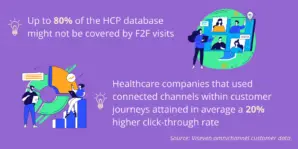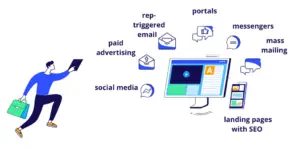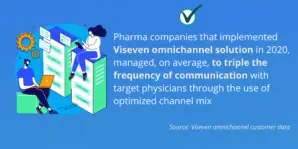How to increase the coverage of healthcare professionals with omnichannel marketing approach
The way of reaching and targeting healthcare professionals and patients is transforming; it is mostly linked to the changing nature of their behaviors, preferences, and priorities. The pandemic has boosted the value of online engagement along with the focus shifted to remote means of communication (which are playing a key role). Pharma marketers are being challenged more than ever to promote pharmaceutical products, evaluate the right mix of channels, and increase coverage of their audience.
Remote, fast, and safe are now widely used adjectives added to the term “communication” (in the life sciences industry, in particular). They became ground words that portray the nature of any social activity across the pharmaceutical marketplace. With social distancing measures and restricted access for medical representatives, pharma executives need to refine their strategies toward building a genuine marketing ecosystem that will suit changing demands, help reach the intended audience, hit business goals, and increase conversions at scale. With many hurdles on the rise, the promotion of pharmaceutical brands to HCPs might not be a quick fix in today’s digital-driven age.
Redefine your channel communication mix
Engaging physicians across traditional marketing channels (aka F2F visits) can lead to many drawbacks, not allowing pharma marketers to attain the desired audience retention rate or even frequency. It goes hand in hand with customers’ growing needs for on-demand content, personalized experiences, and more agile communication models (e.g., digital and non-digital channels). Relying too much on personal visits of medical representatives can now be not sufficient to cover the HCP audience to its fullest extent.
“According to research on Viseven omnichannel customer data worldwide, up to 80% of the HCP database might not be covered by personal visits”.
Still, a pharma company can increase the coverage of healthcare professionals and patients, address any modifications in physicians’ priorities, and meet profile-specific needs.
The shortcut to better pharma customer engagement
Let’s run through 3 core statements, and go more in-depth:
#1 Former pharma marketing models of customer engagement cannot operate in a modern, post-pandemic world (businesses are migrating to the online-driven scope of communication)
#2 Pharmaceutical marketers are prompted to employ a vast mix of digital channels to create a coherent experience for the target audience
#3 Omnichannel acts as the solution that helps increase the coverage of the doctors and patients as well as boost the quality and frequency of communication – without any losses in the share of voice and sales volume

Omnichannel came as the answer
By missing out on the opportunity to use a broader spectrum of channels, pharmaceutical marketers might lack the brand force to effectively build brand awareness as well as have limited coverage of the target audience. However, they can become more nimble in their decision-making process, reach more audiences and develop meaningful relationships when adopting omnichannel tactics.
“As per statistics, 65% of modern physicians use social media for professional purposes, and over 70% of HCPs search for scientific data online daily”.
As one would expect, the trend is gaining momentum: physicians are becoming more educated outside of visits with pharmaceutical representatives. A medical representative is supposed to be more of an advisor, a supporter, someone who helps build the loyalty and trust to pharmaceutical brands but not just sells. Besides, using personal visits as the core marketing touchpoint might result in high cost-per-contact or negatively impact your business ROI.
The omnichannel approach came as the solution to any concerns faced by pharma marketers. Such a strategy enriches a communication mix (that used to rely on a single channel or isolated channels) with other means of engagement such as email, social media, digital advertising, webinars, online events, etc., in which HCPs can obtain information on demand at any particular time. You can build a single marketing ecosystem, increase the target audience coverage and communication frequency.
What channels can pharma combine into an organic omnichannel ecosystem?
Here are some commonly used channels inside journey mapping:
⦁ rep-triggered email
⦁ mass mailing
⦁ messengers
⦁ paid advertising
⦁ social media
⦁ portals
⦁ landing pages with SEO
Here is how that channel interconnection might work inside the omnichannel model (from encountering the first message to making the decision). The company’s goal was, for example, to invite HCPs to a webinar through the email invitation. Some part of the audience opened an invitation and registered through the link. While some physicians didn’t respond to the email (or “skipped” the part of filling up the registration form) since they prefer to use messenger as the main communication channel. In order to reach the registration goal, further communicationwas done through the messenger, and so on.

As one can see, omnichannel orchestration requires deep knowledge of HCP behaviors and needs within each segment. The ultimate benefit of omnichannel is that the key message is always delivered in its entirety through multiple digital and non-digital means. It is a centralized model where all these touchpoints are unified together into coherent storytelling (based on audience preferences). Plus, a customer journey is designed and tailored with robust marketing automation to provide customers exactly what they need at a specific moment, time and place.
“According to research, pharma companies that implemented Viseven omnichannel solution in 2020, managed, on average, to triple the frequency of communication with target physicians through the use of optimized channel mix”.
So, let’s imagine a pharma company planned to increase its presence in a specific area and boost a market share. F2F visits were chosen as the main marketing channel. Medical representatives managed to capture contact details, but there was no perspective for more interactions.
In what hypothetical cases digital channels can complement F2F visits and improve targeting:
#1 no opportunity for further visits in a specific area (due to restrictions, country-specific regulations, etc.)
#2 there is a perspective to engage but with a low frequency
#3 high-frequency engagements but with the need for follow-up communication or any promotional/medical materials delivery
#4 remote region or region with a low expected profitability
“Viseven omnichannel customer data revealed that pharmaceutical companies (from the Middle-East and Scandinavian countries), which implemented omnichannel tactics, covered 84% of the audience that have not been covered by F2F visits. Previously, the coverage rate was limited by the presence of contact details of physicians”.

How to enhance your omnichannel communication mix
Even with the diversity of the channel “palette”, it turned out that the implementation of omnichannel is not as easy as supposed: digital channels simply merging might be orchestrated as completely different focus areas. Still, a shortcut to omnichannel customer engagement exists. Viseven owns strong expertise in integrating digital and non-digital channels for pharma companies across the globe.
A true omnichannel experience is enabled by the marketing automation system that binds together various channel-specific platforms and tools. We work inside such automation systems, preparing and launching complex, non-linear, and personalized campaigns. You do not need to develop content from scratch each time for every single channel. At Viseven, we can grow omnichannel ecosystem for a pharmaceutical company organically from any stage up.
Contact us to expand your healthcare professionals coverage, create seamless and personalized experiences, and reap the tangible benefits of omnichannel approach implementation.
The post How to increase the coverage of healthcare professionals with omnichannel marketing approach appeared first on Viseven.
